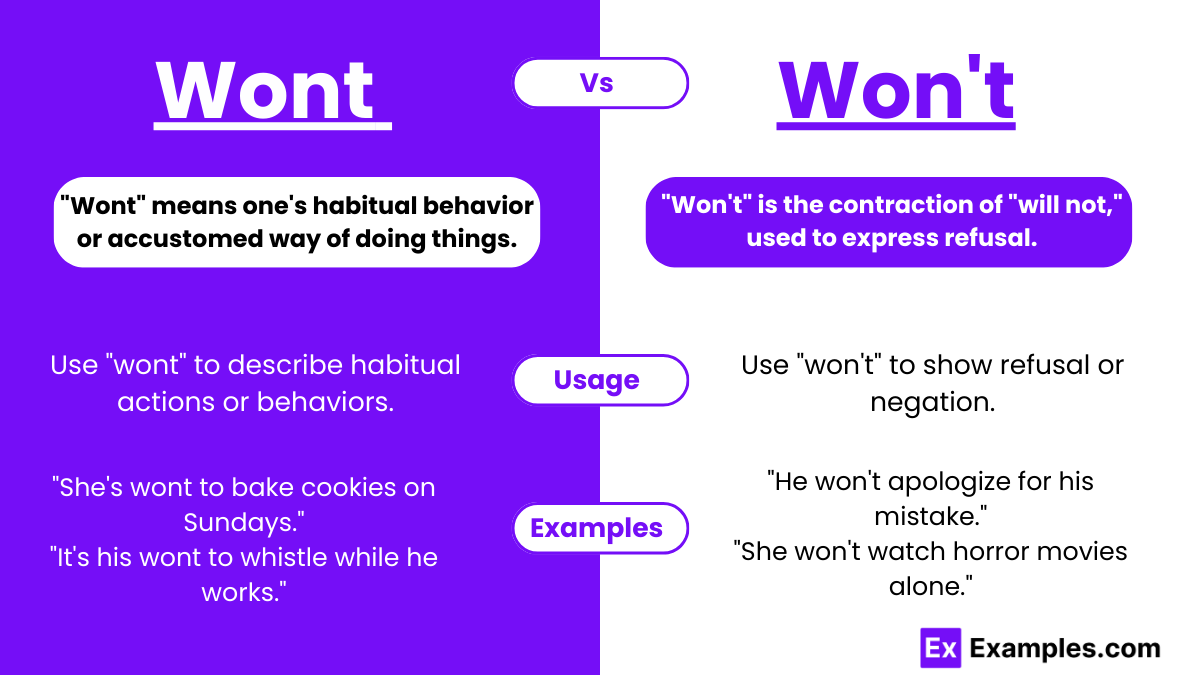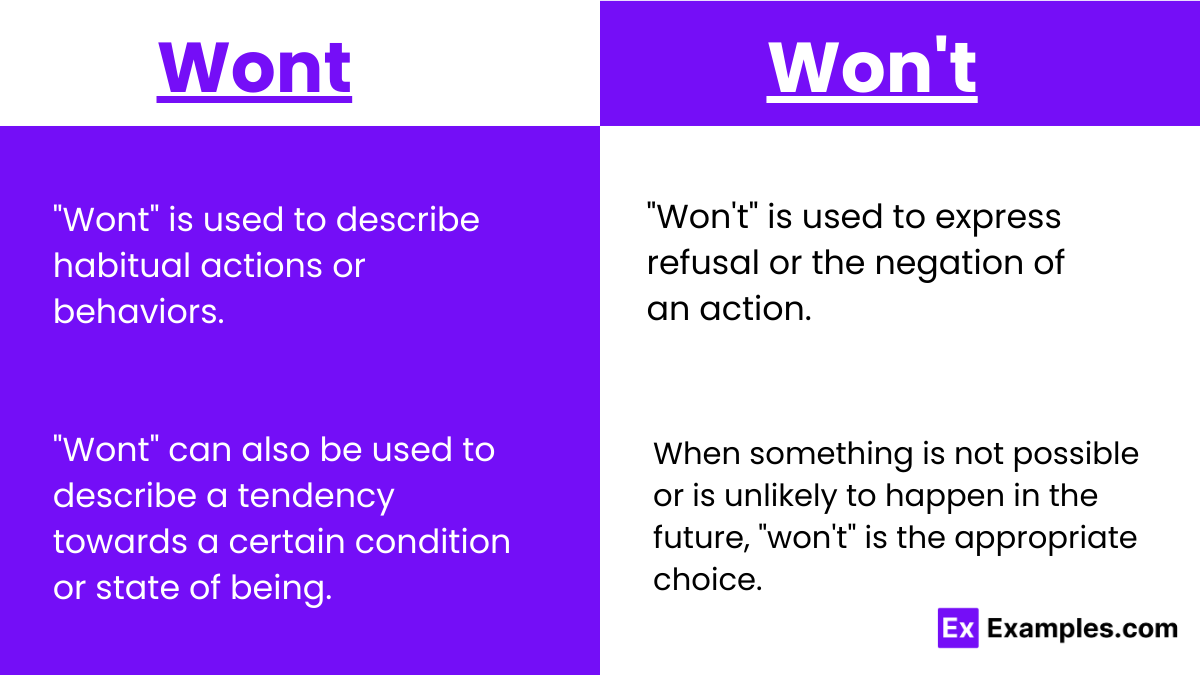Wont vs Won’t – Examples, Differences, Usage, Tips
Venturing into the intricate world of English language, we stumble upon a pair of words that often confound and bewilder students and seasoned writers alike: “wont” and “won’t.” These two terms, seemingly similar at a glance, diverge significantly in meaning and usage, leading many into the pitfall of confusion. As we embark on this exploratory journey, our aim is to demystify these words, offering a beacon of understanding in the labyrinth of linguistic nuances. This article is designed as a compass for students navigating the English language, aiming to elucidate the distinctions between “wont” and “won’t,” ensuring that readers emerge with clarity and confidence in their application.
“Won’t,” the contraction of “will not,” signifies refusal or the act of not doing something, a straightforward concept familiar to many. Contrastingly, “wont” without an apostrophe dives deeper into the realm of behavior, denoting something that is a customary practice or habit specific to an individual. Through this article, we intend to unravel these differences with precision, transforming what might appear as a mere apostrophe’s play into a clear understanding of when and how to use each word correctly. Join us as we shed light on this common conundrum, ensuring that “wont” and “won’t” no longer pose a challenge but become tools of eloquent expression in your linguistic toolkit.
Wont and Won’t – Meanings
Wont: Wont, a word less commonly encountered in everyday language, occupies a niche yet significant place in the English lexicon. It denotes a habitual practice or a custom that is characteristic of a person, group, or entity. Originating from Old English, where it was used in the context of being accustomed or used to something, “wont” encapsulates the essence of regularity and familiarity. When someone is “wont to do” something, it means they are inclined to behave in a certain way out of habit. This term transcends mere action, embedding itself into the very fabric of an individual’s behavior patterns. It’s a linguistic bridge to understanding the subtleties of human habits and tendencies, offering a window into the repetitive actions that define our existence. Wont, therefore, is not just a word but a reflection of the cyclical nature of human behavior, highlighting the practices and routines that become second nature over time.
Won’t: Won’t, the contraction of “will not,” is a fundamental component of the English language, serving a critical role in negation and refusal. It is the shorthand form that combines the modal verb “will,” indicating future action or willingness, with “not,” a negation marker, to create a concise expression of refusal or the impossibility of an event occurring in the future. This contraction is indispensable in spoken and written English, facilitating a smoother and more efficient communication process. “Won’t” embodies the decision not to engage in a particular action or the prediction that a specific event is unlikely to happen. It is a word of resistance and limitation, setting boundaries for what is and isn’t possible or desirable. Through its usage, “won’t” conveys determination, unwillingness, or the lack of necessity, marking it as a powerful tool for expressing definitive stances, making promises, or laying down the law in both personal and professional contexts.
Summary
The English language, we discover the distinct contrast between “wont” and “won’t.” “Wont” highlights habitual behaviors, reflecting practices deeply rooted in one’s character, whereas “won’t” is a concise negation, signaling refusal or the absence of a future action. The presence or absence of an apostrophe dramatically shifts meaning, underscoring the importance of precision in language use. This comparison not only expands our vocabulary but also enhances our understanding of language’s intricate nuances, promoting more effective and precise communication.
Difference Between Wont and Won’t
In the vast and intricate landscape of the English language, navigating the subtleties between words that sound similar but carry different meanings is a common challenge. Among these pairs, “wont” and “won’t” stand out for their distinct usages and implications, despite their phonetic similarity. “Wont” refers to a habit or customary practice, deeply ingrained in an individual’s or group’s behavior. On the other hand, “won’t” is the contracted form of “will not,” signifying a refusal or a future action that is not going to take place. The distinction between these two terms is crucial for accurate and effective communication, as it touches upon the very essence of expressing habits versus intentions or decisions. To illuminate the differences further, let’s explore ten key points that separate “wont” from “won’t” in the table below:
| Aspect | Wont | Won’t |
|---|---|---|
| Meaning | Refers to a habit or customary practice. | A contraction of “will not,” indicating refusal or future inaction. |
| Usage | Describes an habitual action or tendency. | Used to express refusal or denial of future actions. |
| Part of Speech | Noun (when referring to a custom) or adjective (when describing someone with a habit). | Verb (specifically, a modal verb contraction). |
| Examples | “He is wont to start his day with a brisk walk.” | “She won’t agree to the proposal as it stands.” |
| Etymology | Derived from Old English “gewunod,” meaning accustomed. | Contraction of “will not,” with “will” from Old English “willan” (to wish or desire) and “not.” |
| Synonyms | Customary, habitual, usual. | Refuse, decline, negate. |
| Antonyms | Unaccustomed, unusual, atypical. | Will, agree, consent. |
| Context | Often used in more formal or literary contexts. | Common in both spoken and written English, across informal and formal settings. |
| Pronunciation | The same as “won’t” but contextually differs in meaning. | Phonetically identical to “wont” but differentiated by its use and meaning. |
| Common Confusions | Sometimes mistaken for “won’t” when spelling errors occur. | Misused as “wont” by those unfamiliar with the distinction. |
Examples of Wont and Won’t
Some examples of “wont” and “won’t” are as follows
Examples of “Wont”
- She was wont to start her mornings with a brisk walk, regardless of the weather.
- The village is wont to hold a large festival every summer to celebrate the harvest.
- He’s wont to forget his keys, which is why he always keeps a spare under the mat.
- Cats are wont to nap in the sunniest spot of the house.
- The company is wont to donate a portion of its profits to charity each year.
Examples of “Won’t”
- She won’t agree to the terms without further negotiation.
- The car won’t start; it seems like the battery is dead.
- I won’t be able to attend the meeting tomorrow due to a prior commitment.
- This stain won’t come out, even with bleach.
- He won’t eat broccoli, no matter how it’s prepared.
When to Use Wont and Won’t
Choosing between “wont” and “won’t” hinges on the context of your sentence, as each word conveys a distinct meaning:
Usage of “Wont”
- Referring to Habitual Behavior or Custom: Use “wont” when describing an action or behavior that someone regularly does. It’s about patterns or habits that are characteristic of a person, group, or entity.
Example: She is wont to go for a run every morning before breakfast. - Talking about Tendencies: “Wont” can also be used to describe a tendency towards a certain condition or state of being.
Example: The organization is wont to support community projects.
Usage of “Won’t”
- Expressing Refusal or Denial: Use “won’t” as a contraction of “will not” to indicate that someone refuses to do something or that an action will not take place.
Example: He won’t accept the job offer if the salary does not meet his expectations. - Denoting Impossibility or Unlikelihood: When something is not possible or is unlikely to happen in the future, “won’t” is the appropriate choice.
Example: The car won’t start; I think the battery is dead. - Making Predictions about the Future: Use “won’t” to state that something will not occur in the future.
Example: It won’t rain tomorrow, according to the weather forecast.
Understanding these contexts and applying the correct word enhances clarity and precision in communication, allowing for more effective expression of habits, tendencies, refusals, and predictions.
Tips for Wont and Won’t
- Keep in mind that “wont” serves as a descriptor for consistent actions or routines, whereas “won’t” emerges from the amalgamation of “will not,” signifying a forthcoming negation.
- Employ an apostrophe to craft “won’t,” signaling its origin as a condensed form.
- Scrutinize the situational backdrop to ascertain if the message pertains to customary practices or an impending denial.
- Recall that “wont” categorizes recurring practices, contrasting with “won’t,” which forecasts an aversion or impossibility.
- Utilize the presence of an apostrophe as a clue that you’re dealing with a contraction indicating refusal or incapability looking ahead.
- Examine the context meticulously to decide if the discussion revolves around ingrained habits or a rejection anticipated in the future.
- Remember, “wont” characterizes enduring habits, while “won’t” implies a contraction that points to future non-acceptance.
- Insert an apostrophe to distinguish “won’t,” denoting it as a shortened version emphasizing a future act of refusal.
FAQs
Is Wont a Proper Word?
Yes, “wont” is a proper word in English. It describes a habitual practice or a tendency, referring to actions that are regularly performed by a person or group. It’s not a contraction or slang, but a formal term that enriches descriptive language.
Can “Wont” Be Used in the Negative Sense?
No, “wont” cannot be used in a negative sense. It specifically describes habitual actions or tendencies and does not have a negative form. To express habits not performed, alternative phrases must be used.
Are There Other Contractions in English That Are Frequently Confused?
Yes, English contains many commonly confused contractions, such as “it’s” (it is) vs. “its” (possessive form of it), “you’re” (you are) vs. “your” (possessive form of you), and “they’re” (they are) vs. “their” (possessive form of they) vs. “there” (a location or concept).
Is “Won’t” a Formal or Informal Contraction?
“Won’t,” the contraction for “will not,” is used in both formal and informal contexts. It’s universally accepted in written and spoken English, fitting seamlessly into a variety of communication settings.
Is “Wont” Commonly Used in Modern English?
While “wont” is less common in casual conversation today, it remains in use in formal writing and literature. It serves to describe characteristic behaviors or habits, providing a nuanced insight into actions that are typical for an individual or group.





